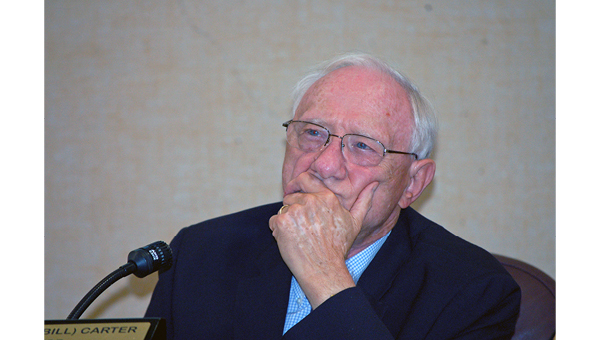Are we all soon to be ‘fugitive slaves’ If birthright citizenship is killed?
Published 10:10 am Tuesday, February 25, 2025
|
Getting your Trinity Audio player ready...
|
By Kary Love
Soon, unelected co-President Musk may “own” us all as he buys elections with his “free speech” (money is speech per Citizens United).
After his “investment” in the presidency in 2024, Musk now moves into states: “Musk’s attempt to buy Wisconsin’s Supreme Court is a red alert that his attack on democracy isn’t limited to gutting the federal government,” said Wisconsin Democratic Party Chair Ben Wikler.
Trending
If successful, I suspect Musk’s “love of money” will propel him to buy up or seek to use the government to control all jobs, effectively rendering him the massa of the Big Plantation formerly known as the USA. Government of the people may be our last, best hope of preventing us all from being reduced to fugitive slaves. Let me explain.
I have practiced civil and constitutional law for more than 45 years and, until now, never worried about being made a “non-citizen” (though the Bill of Rights protects “people,” so that remains in force—somewhat).
The Constitution, as originally adopted, assumes that there is citizenship of the United States and of the states but does not explicitly state the law of what makes one a citizen of either (other than by giving Congress the power to naturalize). Under Article III, the federal courts were granted jurisdiction over controversies between citizens of different states and thus assumed that some people have state citizenship.
Article II requires that only a natural-born citizen of the United States, or a citizen of the United States at the time of the adoption of the Constitution, may be president and thus assumes that some people have national citizenship.
Nowhere, however, does the original Constitution lay down a clear legal rule about either kind of citizenship—not, that is, until adoption of the 14th Amendment, which grants citizenship to anyone born in the USA. That includes me and probably you. But if it can be taken away, then we are all reduced to the same legal status as fugitive slaves before the Civil War and the adoption of the 14th Amendment.
Before the Civil War, Black people held in slavery in the South were condemned to a “Twilight Zone” due to the so-called fugitive slave clause in the Constitution. Found in Article IV, Section 2, Clause 3, it required a “person held to service or labour” (usually a slave, apprentice or indentured servant) who flees to another state to be returned to his or her master in the state from which that person escaped. (Ironically, this mess resulted because the authors of the Constitution desperately wanted to avoid using the word “slave” in a “charter of freedom” while still reaching a “compromise” that would allow states in which slavery was legal under state law to ratify the Constitution; thus, the evil of slavery was a cancer on the Constitution from the beginning.)
Trending
The enactment of the 13th Amendment, which abolished slavery except as a punishment for criminal acts, has made the fugitive clause mostly irrelevant. (Note: There is no exception for the type of slavery known as “the military draft.”) The U.S. Supreme Court made Black people’s status worse in the infamous Dred Scott decision, which held that Black slaves were not citizens and were “property” (some argue therefore they were not even “people”).
Despite this state of the “law,” enslaved people from the South sought freedom as though they were people despite the “law,” both by massive uprisings or rebellions as well as fleeing the South as “runaways.” Note this was like those white migrants who ran from serfdom, peasanthood or indentured service—or whatever second-class status to white “aristocrats” was called in England, Russia, France and other nations—seeking freedom from rule by their “betters.” I guess migrants have long been a problem. Surely the aborigines agree, though they often granted sanctuary, and there was no such thing as an “illegal migrant,” as citizenship was yet to be invented.
In the North lived many free Black persons who joined with white abolitionists to oppose this apparent violation of the principles of the nation. The Declaration of Independence proclaimed that all humans “were created equal” and endowed with certain “inalienable rights” that could not be taken away by government. Furthermore, it declared that if any government tried to take those rights away, then the people had a “duty to alter or abolish” such “illegitimate” government. Additionally, many argued from their religious beliefs that since God had created all people in his likeness, all people were equal before the law of God and that the “higher law” foundation of American law required rejection of slavery, period.
Resistance mounted in the North, and Congress adopted a fugitive slave act (FSA) enabling recapture of persons escaped from such bondage. The FSA was born evil, in opposition to freedom, and unsurprisingly incorporated more violations of freedom in its execution:
- It required Americans to actively assist any attempts by law enforcement to arrest accused runaways (not unlike the current DHS efforts to attack “sanctuary cities” or churches).
- It made the law an uneven playing field by rewarding U.S. marshals more money when they declared a person captured a “runaway” rather than declaring them to be free.
- It ran roughshod over the Bill of Rights by denying trial by jury (despite being required expressly by the Constitution in two places).
- It violated millennia of even the common law human right to habeas corpus by excluding habeas corpus from FSA cases.
- Other unfair requirements also existed, such as requiring two white witnesses to testify to the identity of a Black person claiming to be “free” (very difficult to find in the South, and those in the North not knowing the person while they were in the South could not so testify) and a presumption that a person claimed to be a runaway slave was. In any event, these were not fair trials, nor were they intended to be.
In addition to these fundamental violations of American law, many Christians who interpreted Jesus’s teachings about treating strangers with kindness—(in case they turn out to be Jesus or an angel in disguise to test their faith), among other biblical commandments—rejected the FSA as contrary to God’s law.
One New York convention convened by the people to consider the FSA declared the FSA “is in direct and impious opposition to those laws of God which command deeds of humanity and mercy,” in addition to identifying the foregoing violations of the Constitution rendering the FSA odious.
A lucrative business sprang up, with entrepreneurs charging top dollar to hunt down and recapture runaways. The “slave hunters” were not circumspect about the free or slave status of those they captured, with many free Blacks being wrongfully identified as runaway slaves.
Inevitably, as in all fights for freedom, violence often resulted during such captures, which many called kidnapping. Frederick Douglass noted the reality: “We are all at the mercy of a band of bloodhound commissioners” handling the FSA cases and usually siding with the kidnappers. In the face of such tyranny, Blacks and whites rose up in resistance and, besides providing “illegal sanctuary” (under the laws of man, though arguably required by the laws of God), began fighting FSA cases in the courts.
When criminal cases were brought under the FSA, many juries refused to convict based on such arguments, and over time, even judges in nonjury cases refused to return escaped persons to bondage, finding that a violation of both law and scripture. However, many refugees and migrants seeking freedom, as well as formerly free persons improperly identified and kidnapped, were returned to bondage.
Ultimately, a “civil” war with more than 750,000 dead Americans of all colors settled the question—at least until today, when 14th Amendment “birthright citizenship” enshrined that right in the supreme law that no person, president, Congress or court can violate.
Today, with the move to overturn “birthright citizenship,” I ask: If denial of birthright citizenship is successful, what is the anchor of my own (and your and my and your children’s) citizenship?
As for me, whatever others may do, I will defend by word and deed birthright citizenship for all.
(Kary Love is a Michigan attorney who has defended nuclear resisters in court for decades.)





